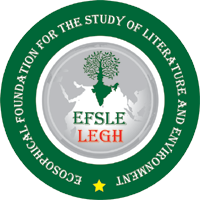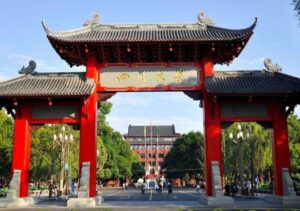EFSLE China Travel Grant 2026
To participate in the International Conference on (Former) Third World Literature and Culture
(8–11 May 2026)
Sichuan University, Unicamp, Chengdu, Sichuan, China
The Travel Grant 2026:
Ecosophical Foundation for the Study of Literature and Environment (EFSLE) invites the proposals for a panel of four (4) to participate in the International Conference on (Former) Third World Literature and Culture, Sichuan University, Unicamp, Chengdu, Sichuan, China.
All the EFSLE lifetime members who are interested in the field, are most welcome to send their proposals for the grant.
Important:
- Only the Lifetime members of EFSLE are eligible for this grant.
- Total Four (4) grants are available for this conference.
- EFSLE will provide the Travel fellowship to those whose proposals will be selected. The decision taken by the selection committee will be considered final and cannot be challenged further.
- The panel will be sponsored by EFSLE consisting of 4 participants.
- Proposals for 20-minute papers and 1.5 hour panels (with 4 presenters)- As the panel consists of four participants, each participant will have 15 minutes followed by Q&A session for half an hour.
- Email your abstract (max. 300 words) with five relevant keywords along with a bio-note (max. 100 words).
- Please send your proposal to info@efsle.org
- Please mention ‘China Travel Grant 2026’ in the subject line.
- The candidates can select any of the themes mentioned below for their proposal.
- Deadlines:
- The deadline for abstract submission- 30 November 2025
- Confirmation of the selected abstracts- 10 December 2025
- The deadline to submit the full paper- 31 January 2026
- Announcement of the selected participants- 15 February 2026
- All the grant recipients are eligible to avail the total expenses of the return flight ticket (tickets will be booked by EFSLE only- selected participants are not allowed to book the tickets their own).
- The grant covers the return flight ticket expenses only.
- No other expenses other than the return flight ticket will be covered under this grant.
- This grant doesn’t cover the accommodation expenses and the registration fee as well. However, EFSLE will help out to provide the accommodation on an affordable price, if sought by the selected participants.
- If accommodation is required,
The check-in will be on May 07, 2026 and the check-out will be on May 12, 2026.
Details of the Conference:
Theme of the Panel
Degendering Gender and the Eco-Literary Protests: The Literatures of the Cold War Era
Concept Note:
This panel is uniquely designed as it includes four distinguished research papers which will be presented in the form of a workshop that includes interactive sessions with the participants engaging them to explore the labyrinth and esoteric perception of gender during the cold war era. All the four papers are seeking to find a way where the study of Literatures written during the cold war era and their Gender concerns interface incorporating their ecological bonhomie and to find out the factors those paved an intricate way meticulously regarding the gender discourse further in the multi-polar world.
‘Gender’ is a term which has been always amiss interpreted since it adopted other phenomenon regarding its meaning and deconstructed its own identity from the traditional linguistic and grammatical existence. The term ‘Gender’ does not endeavour to empower only the female aesthetics in terms of their social, cultural and psychological consciousness but, in fact, it transcends the idea of feminism, gynocriticism and biological sexual differences. The concept of gender can be aptly understood through its different functioning as it provides a multidisciplinary ground to conduct a comparative study between women and men and beyond. Gender necessarily interpolates masculinity in its analysis. Nevertheless, by the mid-1980s this masculine mode of interpretation, representation and formulation were questioned and the problem of male authorization was also discussed. In the course of time, gender substituted the synthesis of various social contrasts for biological doctrine of intricate sexual differences including queer theory, gay and lesbian studies and the study of the most commonly castrated persons the eunuchs.
Political-historians have established that gender was a climacteric element during the Cold War however, there are less written texts available witnessing this truth. The most significant reason was the complete era was dominated by masculinized security, sexualized languages and the stereotyped gender roles. Eco-narratives and gender role in the form of Eco-literary protests became the thrust areas to be explored by most of the women writers of the (former) third world nations namely Vandana Shiva, Chitra Sankaran and Kamala Markandaya (India), Wangarĩ Maathai (Kenya), Buchi Emecheta (Nigeria), Ama Ata Aidoo (Ghana), Kumari Jayawardena and Punyakante Wijenaike (Sri Lanka), Salmi Manja (Malaysia) and Ana Isla (Peru).
Thus gender is basically a behavioural science that articulates the sexual and non-sexual discourses and degendering is the process of refinement of the conventional gendered features. Ecological amiability along with the gendered narratives opens a gateway to investigate the temporality of the masculine supremacy of the cold war politics. It deals, indeed, what is beyond this intervention.
We invite paper and panel proposals including, but not limited to, the following topic areas:
- Gendered Ecology and the Cold War Era
- The ‘Third’ World Literatures and Gender Discourse
- Ecofeminism and the new voices of resistant during the cold war era
- Intersectional Ecofeminism and the masculinized cold war era
- Eco-literary protests to denigrate the sexualized languages and discorded gender-role
- Cultural Cold War and rethinking of Gender and Domesticity
- The Power politics, Resource Control and women laborers
- Textual Connotations and Ecological absorption: The cold war reminiscence
- An Ecosophical Journey of the Asian women writers during the Cold war era
- Superpower Visions: U.S. and Soviet Engagement with Gender and Minority Issues in the Third World
- Cold War Bodies: Women and Minorities in Third World Cultural Production under Superpower Gaze
- Indigeneity, African Women writers and the cold war sway
- Latin American defiances and the Ecolibrium Effect towards a multipolar world
Key Points to be remembered:
Date of Conference: 8–11 May 2026 (Friday-Monday)
Mode: Offline (For EFSLE Panel)
Host: Sichuan University, Unicamp, Chengdu, Sichuan, China
Location: Sichuan, China
Contacts:
Please direct all inquiries to the following members:
Email: info@efsle.org
Whatsapp: Kumar Paarth, Programme Coordinator, EFSLE – 9953833313
Venue Information:
Sichuan University (SCU) is one of China’s top universities, attached to the Ministry of Education. Sichuan University is located in Chengdu, a famous historical and cultural capital city of Sichuan Province, known as the land of abundance. It consists of three campuses: Wangjiang, Huaxi and Jiang’an, The university campuses, with their favorable environment and beautiful landscape, make a wonderful place for learning and research. Sichuan is the hometown of the Giant Panda.
Welcome to the Hometown of the Giant Panda!


